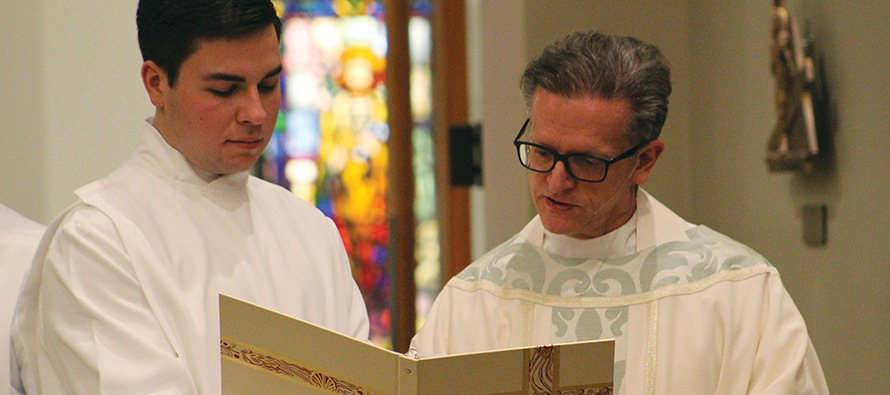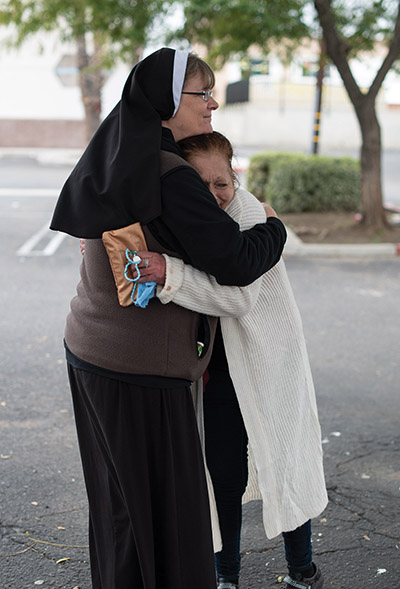A charism encourages a caring ministry

Members of religious orders of priests naturally are involved in the liturgical life of the church. Father Paul English, C.S.B. reviews material prior to a liturgy. (Photo: Courtesy of the Basilian Fathers)
MY JOURNEY into religious life began with a construction project in my college dorm. As jackhammers rang outside, I sought refuge in the chapel and in campus events, including events run by campus ministry. I was running away from the noise, but before I knew it, my faith began to flourish.
On top of that, during my college years I providentially met a De La Salle Christian Brother. He opened up some new opportunities for me, including inviting me to meet other young men also interested in religious life, extending an invitation to live in their community, and inviting me to lead community service projects for high school-aged young men. Through these experiences and others, I began to understand that ministry flows from charism, which is the spirituality or personality of a religious institute.
The NRVC 2020 Study on Recent Vocations to Religious Life found that charism and mission are two of the key things that draw young people toward religious life. In a discussion about charisms and ministries with fellow religious, we came up with the following ideas that we have found to be true as we live out our vocations.
1) Ministry flows from charism. Therefore, when discerning a vocation with a particular community, it is important to see how the charism is lived out in daily life.
Some religious communities have very specific charisms that define their ministry. Having just completed the early part of my entrance to the Brothers of the Christian Schools, I know the Lasallian charism emphasizes human and Christian education for the poor. That means our charism is specifically tied to education. Not all charisms have such an overt connection to ministry. But some do. Other groups that have ministerially defined charisms are the Alexian Brothers, whose charism and ministries are focused on healing and healthcare, and the Little Sisters of the Poor, whose charism and ministries are focused on homes for the aged.
Many religious communities have charisms that do not necessarily define the ministry, but they often give it a particular twist. For example, an institute’s overall charism may be focused on mercy and hospitality but not specify any particular ministry that defines the religious community. Much like the “family spirit” found within one’s immediate family and extended family, groups such as the Dominicans and Franciscans may have similar roots but each with a unique expression of their charismatic gift. Brother Steven Vasoli, F.S.C. states, “Members of religious communities seek to engage in ministries that they see as encompassing this charism and attempt to bring the charism into their ministry.”

No matter the approach, charism is a gift of the Holy Spirit to the church found in the hearts and spirits of various communities and members. It serves as a uniting force. Keeping in mind again that ministry flows from charism, this uniting force of charism has been passed on for centuries, overlapping numerous generations of members within religious communities and giving birth to various ministries. But how is this possible?
2) Charism is both a natural part of members and something the community intentionally nourishes and cultivates.
In a conversation with veteran vocation director Sister Charlene Henrinckx, S.S.M.O., she pointed out, “Candidates are not taught the charism but instead they were attracted to a community because the candidate, with his/her [own] charism, resonates with that of the community.” I like that insight, so let me repeat it: People who are accepted into a religious community already have the charism of that community. That’s why they were naturally attracted to the community in the first place. The community recognized their own charism in these applicants, and so they accepted them.
Personally, it has been the brothers’ genuine humility and zeal for the mission and ministry of education that has led me to form natural connections and relationships with older brothers over the years. Having taught with brothers and sisters alike in a number of high school ministries, I know the passion and success of a ministry that flows from charism.
3) Ministry is bigger and richer than a necessary task.
Father Raymond Carey spoke to the members of the 2020-2021 Inter-Congregational Novitiate program on the importance and value of cultivating ethical and professional relationships in our ministries. He emphasized that ministry is not merely a job or way of making sure you contribute back to your community. Ministry involves the acceptance that there is a need to be met by sharing one’s gifts in an act of service. A thriving ministry has at its center members who exude positive qualities focused on the bigger picture, and who have trust and faith in God and each other.
I attribute my outlook on ministry to my role models who have taught me that ministry is a simple act of embracing the call to enter into a relationship with those to whom you are ministering, as well as with your colleagues, both lay and religious. Ministry has become an extension of my own family, my original community. My family has always encouraged me to be authentic, genuine, and faithful to God as a disciple of Christ. They serve as a constant reminder to continually embrace the values of respect and service to one another as brothers and sisters in Christ.
I hope that these few thoughts on charism and ministry help bring you some clarity, peace, and support as you continue to think about the journey ahead. I’ve had quite a journey, starting with those early days in college when I first met my community until this moment of sharing insights about religious life. A great friend and mentor once told me, “Don’t look at it as a big commitment. View it instead as a series of intimate, daily commitments to God, yourself, and others. Every day, another yes to continuing to try out the consecrated life.”
A version of this article first appeared as a presentation in the NRVC webinar series “Religious Life Today: Learn it! Love it! Live it!” Find more about the series here: nrvc.net/webinars.
Related article: VocationNetwork.org, “What is charism?”
Tags
Related
- Questions you’ll be glad you asked
- What monastic mystics got right about life
- Religious communities embrace diverse members
- How my parents responded when I became a brother
- Vocation Basics: You are already called—Message to youth from Pope Francis
- Meet the parents
- Charism: The gift that shapes lives
- What our vows mean
- Discover five treasures of religious life
- Religious making a difference Read More
Most Viewed
- Find your spirituality type quiz
- Questions and answers about religious vocations
- Celibacy quiz: Could I be a nun? Could I be a brother? Could I be a priest?
- Resources for older discerners or those with physical and developmental differences
- About Vocation Network and VISION Guide


